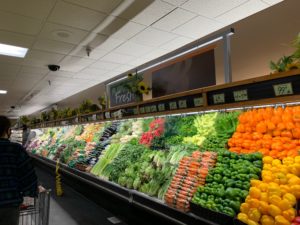Bashas’ is working to streamline the path of local foods to consumer tables.
Arizona’s Bashas’ Family of Stores has taken an innovative step forward to speed up the connection between grocers and local suppliers by partnering with Forager, an East Coast online and mobile platform.
Bashas representatives say that during the pandemic, consumers have increased their focus on local suppliers as sources of high quality, nutritious and fresh foods that will both protect their health and put money back into local economies.
This focus on shopping local, magnified during a crisis, is in line with the increasing popularity over several decades of farmers markets and Community Supported Agriculture (CSA).
The Bashas’ chain, founded in 1932 and with more than 118 locations across Arizona, has long been known for being at the center in this hunt for local suppliers to fill the demand for fresh products.
“Focus on local community, the local economy and local vendors is truly the bedrock of Bashas’ Family of Stores,” said Steve Mayer, Bashas’ senior vice president of marketing, merchandising and procurement. “We are the hometown grocer and have always been focused on taking care of Arizonans, whether through providing jobs for a smaller community or selling goods from local and hyper-local suppliers.”
From the Bashas’ point of view, the technology that Forager uses will streamline the process of getting food and other products to consumers, and give the grocer an edge in the state’s crowded and lucrative grocery sector.
“One of the biggest and most publicly noticed challenges at the very beginning of the pandemic was the absence of many items, resulting from the initial wave of panic purchasing,” Mayer said. “This was something experienced across the country. While the majority of items have returned to ‘regular’ available levels, there continue to be some products that remain hard to source.”
Another change for stores during the pandemic has been less foot traffic, but at the same time, consumers are making larger purchases.
“That shift [to fewer trips to the store] makes it all the more important to capture those sales when the customers are there and ensuring we have what they are looking for,” he noted.
An additional challenge has been the reliance of supermarkets on the trucking industry to transport food long distances, sometimes resulting in produce remaining in the back of a truck for days.
The sophisticated Forager model is an effort to solve many of these challenges. David Stone, a serial entrepreneur, launched Forager in 2015 in Portland, Maine “out of a desire to improve his family’s nutrition and health that led him on a three-month exploration of food systems around the world,” said Forager’s Joe Blunda.
That search led to the establishment of digital local food supply chains in multiple locations throughout the United States.
“Our partnership with Bashas’ is local to their geography [all of Arizona],” Blunda explained. “It began through direct outreach to them via our network. At the time, they had just established their forward-looking strategy to drive growth, and had decided that evolving their local buying program was a critical piece of their future. So, the timing for us to connect was ideal.”
The partnership with Bashas’ expands on some of the initial work by Forager in Arizona supporting food access and justice during the height of the pandemic, he added.
Mayer said the Forager model helps “bring all of the pieces together” by helping to “tap into and showcase” a lot more local suppliers.
“Forager is a way for both the supplier and ourselves to get connected in a more powerful way,” he said. “We can now source products from a local company for just one store, for a few stores or for every store.”
It seems the new partnership and its state-of-the-art local sourcing program is right in line with the mood of consumers.
According to the Forager website, “85% of shoppers would likely change grocers to find more local food,” and “96% of shoppers agree that local food is the freshest, healthiest, most nutritious and safest food available.”
“Forager is a digital SAAS (software as a service) platform that connects wholesale and retail buyers with local independent farmers, fishers and grocers to manage discovery, procurement and payment processing,” said Blunda. “David’s passion is to make locally sourced food more widely available to all, by removing the considerable cost and complexity in the local food supply chain and digitally connecting grocers with new local suppliers.”
By streamlining the procurement-to-payment process, Forager’s online and mobile platform saves time and costs for grocers, co-ops, farmers, producers and other buyers and sellers of local food.
“For supermarkets, the platform is intuitive, easy to use, and cost effective,” Blunda said. “It allows operations to quickly scale without being hung up on manual processes that can stop local programs from growing.”
He added that farmers can seamlessly connect with suppliers and manage all transactions “so they can go back to their trade without having to worry about the back-end business.”
The new effort with Bashas’ is a pilot program for Forager.
“The launch phase of our relationship is certainly an opportunity for both Bashas’ and Forager to confirm that our partnership will truly drive the evolution of local at Bashas’ that we are both excited to achieve,” said Blunda. “We are both very confident of success, but testing and refining our approach before we scale across their full store footprint is vital.”
So far, local suppliers have been happy with the addition of the Forager process to Bashas’ grocery outlets.
“Absolutely. We are getting a lot of positive feedback and the local suppliers are finding the process much easier than going at it alone,” Mayer said. “In addition, many suppliers are excited because we are actively seeking them out for our stores.” QCBN
By Betsey Bruner, QCBN







Leave a Reply